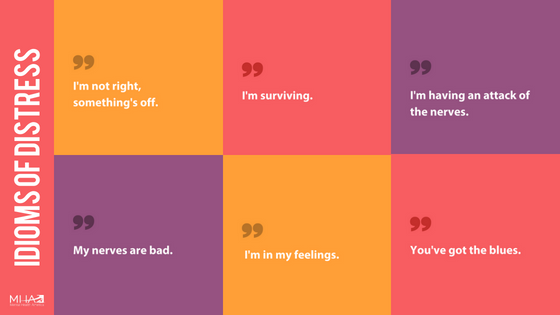July is Minority Mental Health Awareness Month, and as we have previously shared mental illness affects one in five adults in America and is a leading cause of disability. Unfortunately, almost two-thirds of people with a diagnosable mental illness do not seek help, and racial and ethnic groups are even less likely to get help. (1)
Furthermore, studies have shown that mental health is a major concern for American Indians and Alaska Natives (AI/AN). Specifically, AI/ANs have a higher prevalence of a variety of mental health conditions, experience PTSD twice as often as the general population, and are known to “…experience serious psychological distress 1.5 times more than the general population”. (2)
#MyStoryMyWay
This year for Minority Mental Health Awareness Month one of the themes is #MyStoryMyWay. The goal of #MyStoryMyWay is to “shed light on the multitude of mental health experiences within [a variety of] communities.”
One interesting concept of the #MyStoryMyWay campaign is the identification of idioms, “…an expression whose meaning is not predictable from the usual meanings of its constituent elements,” used to describe mental health or illness. (3) As Mental Health America provides, although many people say they don’t talk about mental health issues or mental illness, “…people do talk about these issues, but they express themselves differently. The phrases and expressions that people use to talk about these issues oftentimes never touch on terms like ‘mental health’ or ‘mental illness.’” (4) Some examples they used can be found in the following infographic:
 We thought a great way to share some information on mental health awareness and to break the stigma it would be to share some Native idioms that are used for mental health and illness and ask others to identify idioms used in your own culture, family, or area.
We thought a great way to share some information on mental health awareness and to break the stigma it would be to share some Native idioms that are used for mental health and illness and ask others to identify idioms used in your own culture, family, or area.
Some examples of Native idioms that can relate to mental health, taken from a research paper, include:
- Ghost sickness
- Pibloktoq (Inuit)
- Soul loss
- Iich’ aa (Navajo)
- Witchcraft (Navajo)
- Fatigue from thinking too much
- Wacinko syndrome (Oglala Sioux, Lakota Sioux)
- Windigo (Northern Algonkian, Cree, Ojibwa, Salteaux)
- Crazy sickness (Navajo)
- Worry sickness or turning one’s face to the wall (Hopi)
- Heartbreak (Mohave)
- Kayak angst (Inuit)
- Hiwa: itck (Mohave)
- Tawatl ye sni (Dakota Sioux) (5)
What idioms does your culture, family, or area use to describe mental health and illness?
Sources
- US Department of Health and Human Services Office of Minority Health. (2017, July 7). Minority Mental Health Awareness Month – July. Retrieved July 19, 2017, from https://minorityhealth.hhs.gov/omh/content.aspx?ID=9447&lvl=2&lvlid=12
- American Psychiatric Association Office of Minority and National Affairs. (2010). Mental Health Disparities: American Indians and Alaska Natives. Retrieved July 19, 2017, from https://www.integration.samhsa.gov/workforce/mental_health_disparities_american_indian_and_alaskan_natives.pdf
- Dictionary.com. (n.d.). Idiom. Retrieved July 9, 2018, from http://www.dictionary.com/browse/idiom
- Mental Health America. (2018, July 05). Minority Mental Health Month. Retrieved July 9, 2018, from http://www.mentalhealthamerica.net/minority-mental-health-month
- Thomason, T. (2014). Issues in the Diagnosis of Native American Culture-Bound Syndromes [PDF]. Northern Arizona Univesrity.
Leave a Reply